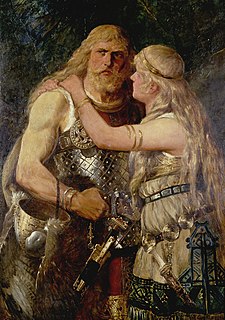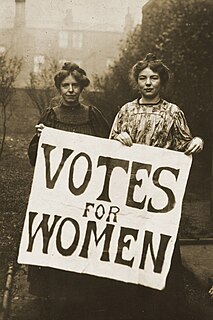Related Research Articles

Marriage, also called matrimony or wedlock is a culturally and often legally recognized union between people called spouses. It establishes rights and obligations between them, as well as between them and their children, and between them and their in-laws. It is considered a cultural universal, but the definition of marriage varies between cultures and religions, and over time. Typically, it is an institution in which interpersonal relationships, usually sexual, are acknowledged or sanctioned. In some cultures, marriage is recommended or considered to be compulsory before pursuing any sexual activity. A marriage ceremony is called a wedding.

The Privy Council of the United Kingdom, officially Her Majesty's Most Honourable Privy Council, or known simply as the Privy Council, is a formal body of advisers to the sovereign of the United Kingdom. Its membership mainly comprises senior politicians who are current or former members of either the House of Commons or the House of Lords.
Adultery is extramarital sex that is considered objectionable on social, religious, moral, or legal grounds. Although the sexual activities that constitute adultery vary, as well as the social, religious, and legal consequences, the concept exists in many cultures and is similar in Christianity, Judaism and Islam. Adultery is viewed by many jurisdictions as offensive to public morals, undermining the marriage relationship.
When a person assumes the family name of their spouse, in some countries that name replaces the person's previous surname, which in the case of the wife is called the maiden name, whereas a married name is a family name or surname adopted by a person upon marriage.

Women's rights are the rights and entitlements claimed for women and girls worldwide. They formed the basis for the women's rights movement in the 19th century and the feminist movements during the 20th and 21st centuries. In some countries, these rights are institutionalized or supported by law, local custom, and behavior, whereas in others, they are ignored and suppressed. They differ from broader notions of human rights through claims of an inherent historical and traditional bias against the exercise of rights by women and girls, in favor of men and boys.

A wife is a female in a marital relationship. A woman who has separated from her partner continues to be a wife until the marriage is legally dissolved with a divorce judgement. On the death of her partner, a wife is referred to as a widow.The rights and obligations of a wife in relation to her partner and her status in the community and in law vary between cultures and have varied over time.
Matrimonial regimes, or marital property systems, are systems of property ownership between spouses providing for the creation or absence of a marital estate and if created, what properties are included in that estate, how and by whom it is managed, and how it will be divided and inherited at the end of the marriage. Matrimonial regimes are applied either by operation of law or by way of prenuptial agreement in civil-law countries, and depend on the lex domicilii of the spouses at the time of or immediately following the wedding.. In most common law jurisdictions, the default and only matrimonial regime is separation of property, though some US states, known as community property states, are an exception. Also, in England, the birthplace of common law, pre-nuptial agreements were until recently completely unrecognized, and although the principle of separation of property prevailed, Courts are enabled to make a series of orders upon divorce regulating the distribution of assets.
A dowry is a payment, such as property or money, paid by the bride's family to the groom or his family at the time of marriage. Dowry contrasts with the related concepts of bride price and dower. While bride price or bride service is a payment by the groom, or his family, to the bride, or her family, dowry is the wealth transferred from the bride, or her family, to the groom, or his family. Similarly, dower is the property settled on the bride herself, by the groom at the time of marriage, and which remains under her ownership and control.
Marital rape or spousal rape is the act of sexual intercourse with one's spouse without the spouse's consent. The lack of consent is the essential element and need not involve physical violence. Marital rape is considered a form of domestic violence and sexual abuse. Although, historically, sexual intercourse within marriage was regarded as a right of spouses, engaging in the act without the spouse's consent is now widely classified as rape by many societies around the world, repudiated by international conventions, and increasingly criminalized.
Coverture was a legal doctrine in common law whereby, upon marriage, a woman's legal rights and obligations were subsumed by those of her husband, in accordance with the wife's legal status of feme covert. An unmarried woman, or feme sole, had the right to own property and make contracts in her own name. Coverture arises from the legal fiction that a husband and wife are one person.
Hindu texts present diverse and conflicting views on the position of women, ranging from feminine leadership as the highest goddess, to limiting gender roles. The Devi Sukta hymn of Rigveda, a scripture of Hinduism, declares the feminine energy as the essence of the universe, the one who creates all matter and consciousness, the eternal and infinite, the metaphysical and empirical reality (Brahman), the soul, of everything. The woman is celebrated as the most powerful and the empowering force in some Hindu Upanishads, Sastras and Puranas, particularly the Devi Upanishad, Devi Mahatmya and Devi-Bhagavata Purana.

Gender equality, also known as sexual equality or equality of the sexes, is the state of equal ease of access to resources and opportunities regardless of gender, including economic participation and decision-making; and the state of valuing different behaviors, aspirations and needs equally, regardless of gender.
First-wave feminism was a period of feminist activity and thought that occurred during the 19th and early 20th century throughout the Western world. It focused on legal issues, primarily on securing women's right to vote.

The legal rights of women refers to the social and human rights of women. One of the first women's rights declarations was the Declaration of Sentiments. The dependent position of women in early law is proved by the evidence of most ancient systems.

Dower is a provision accorded by law but traditionally by a husband or his family, to a wife for her support should she become widowed. It was settled on the bride by agreement at the time of the wedding, or as provided by law.

Myra Colby Bradwell was an American publisher and political activist. She attempted in 1869 to become the first woman to be admitted to the Illinois bar to practice law, but was denied admission by the Illinois Supreme Court in 1870 and the United States Supreme Court in 1873, in rulings upholding a separate women's sphere. She had founded and published Chicago Legal News from 1868, reporting on the law and continued that work. Meanwhile, influenced by her case, in 1872 the Illinois legislature passed a state law prohibiting gender discrimination in admission to any occupation or profession.

The Married Women's Property Act 1882 was an Act of the Parliament of the United Kingdom that significantly altered English law regarding the property rights of married women, which besides other matters allowed married women to own and control property in their own right.

The Custom of Paris was one of France's regional custumals of civil law. It was the law of the land in Paris and the surrounding region in the 16th–18th centuries and was applied to French overseas colonies, including New France. First written in 1507 and revised in 1580 and 1605, the Custom of Paris was a compilation and systematization of Renaissance-era customary law. Divided into 16 sections, it contained 362 articles concerning family and inheritance, property, and debt recovery. It was the main source of law in New France from the earliest settlement, but other provincial customs were sometimes invoked in the early period.
The Married Women's Property Acts are laws enacted by the individual states of the United States beginning in 1839, usually under that name and sometimes, especially when extending the provisions of a Married Women's Property Act, under names describing a specific provision, such as the Married Women's Earnings Act. The Married Women's Property Acts helped to rectify some of the difficulties that women faced under coverture, the English common law system that subsumed married women's ability to own property, wages, enter into contracts, and otherwise act autonomously, to their husband's authority. After New York passed their Married Women's Property Law in 1848, this law became the template for other states to grant married women the right to own property.
Timeline of women's legal rights represents formal changes and reforms regarding women's rights. That includes actual law reforms as well as other formal changes, such as reforms through new interpretations of laws by precedents.
References
- ↑ "Married Women's Property Laws". Law Library of Congress. Retrieved March 15, 2011.
- ↑ Jone Johnson Lewis. "Married Women's Property Act: 1848, New York State" . Retrieved March 15, 2011.